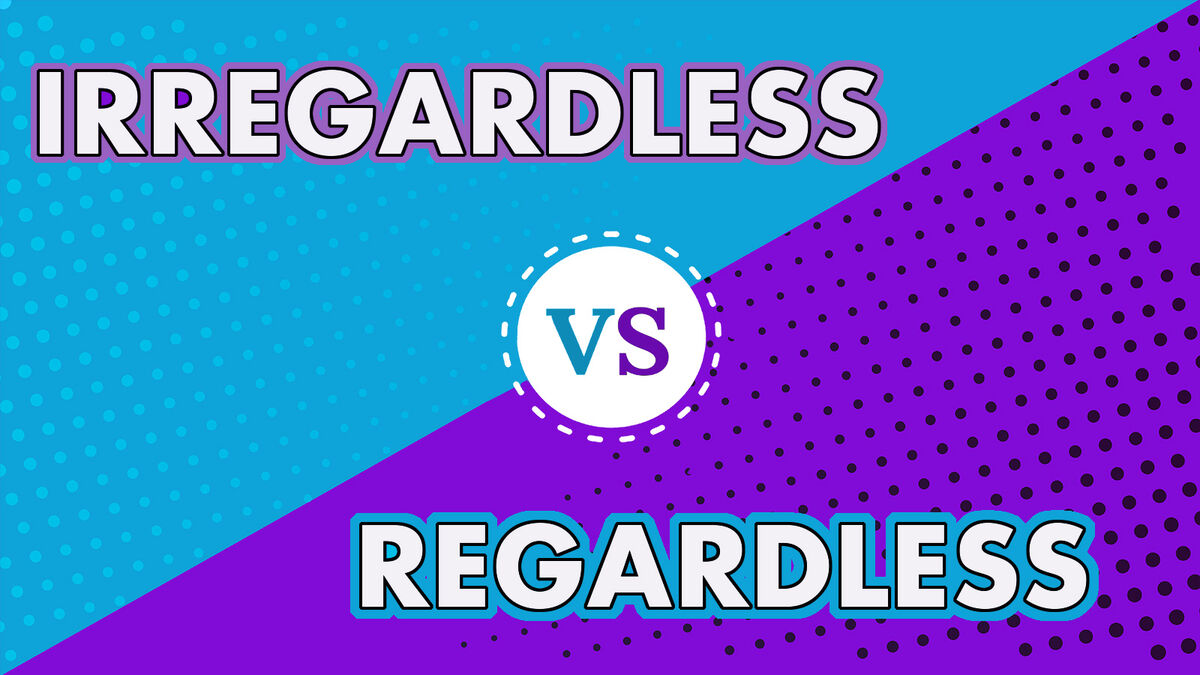
The irregardless vs. regardless debate has been raging among common folk and language experts for centuries. No matter your feelings about the term, irregardless is a word. However, it’s not necessarily the same as the word regardless. Explore the intricacies of both to see how they differ.
Main Difference Between Irregardless and Regardless
The main difference between irregardless and regardless is that irregardless is used only in informal settings, while regardless is used in informal and formal contexts.
Definition of Regardless
Regardless is an adverb defined as something not dependent on current circumstances, anyway, or despite everything. It can also be used as an adjective meaning careless.
Regardless Word Construction
Regard is the main root word of regardless. It is defined as consideration or concern. When you add the suffix -less, it negates the root word because this suffix means without. When you put the pieces together, regardless means without regard.
Examples of Regardless in a Sentence
Seeing how regardless is used in proper language can help you better understand the word.
- “I believe in human beings, and that all human beings should be respected as such, regardless of their color.” - Malcolm X
- I’m jumping out of the plane tomorrow, regardless of your feelings.
- Regardless of your suspicions, she’s innocent until proven guilty.
Definition of Irregardless
Irregardless is an adverb or adjective defined as a nonstandard way of saying regardless. So, irregardless is essentially a synonym of regardless.
Is Irregardless in the Dictionary?
Irregardless is found in most dictionaries. It is listed as a nonstandard word, meaning it doesn’t conform to grammar standards and isn’t generally used by educated native speakers of English. Its listing in dictionaries indicates it is a word with widespread use, but that doesn’t mean professionals endorse its use.
Irregardless Word Construction
The root word of irregardless is also regard, which means consideration. The prefix -ir negates the root because it means not. So, irregard would logically mean not regard. What gets tricky is irregardless doesn’t follow grammar standards. The suffix -less means without, so it seems irregardless means not without regard. The double negative doesn’t make logical sense.
Irregardless is thought to be the blending of the words irrespective, which is a synonym for regardless, and regardless. The first known use of the word was in 1795.
Examples of Irregardless in a Sentence
If you’re using the dictionary definition of irregardless, you would simply use it in place of regardless in a sentence.
Example 1:
I’m jumping out of the plane tomorrow, irregardless of your feelings.
However, when people who use irregardless as part of their dialect say the word, it has a slightly different connotation. In this context, it’s used to end a conversation once and for all, so it’s more powerful than regardless.
Example 2:
-Mom, I’m jumping out of a plane tomorrow! It’s really safe these days.
-Regardless, I don’t think it’s a good idea.
-I really want your support. I have to do the training and jump with an instructor.
-You won’t get my support, irregardless.
Is Irregardless a Real Word?
The fact that you’re talking about the word right now tells you it’s a real word. You hear it in conversation, it has a meaning, and it is marked in dictionaries. All of this makes irregardless a real word.
If your question is really, “Can I use irregardless in a school paper or professional context?” The answer would be, “It’s not recommended.”
Speaking Proper English
Lots of words exist in the English language that are acceptable for informal use but not acceptable for formal use, like irregardless. Explore more commonly misused words to see if you’re speaking or writing in proper English.